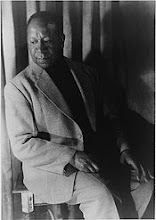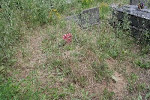An important part of my visit to Knoxville was having the occasion to visit places important to Beauford's life there.
I had long since learned that the original family home at 815 East Vine Street had been destroyed and that the Delaneys moved to a house on Dandridge Avenue.
What I didn't know was why the original home was destroyed. I learned all about this through a visit to the Beck Cultural Exchange Center.
Beck Cultural Exchange Center (rear)
© Wells International Foundation
Beck's president and CEO, Rev. Reneé Kesler, welcomed Link Sylvia Peters (my gracious hostess for this trip) and me to the Center on Wednesday morning. Rev. Kesler explained how the process of urban renewal, also known as "urban removal," decimated the geographical area occupied by African Americans in Knoxville from 1959 to 1974. The original Delaney home disappeared along with hundreds of others, as did the Delaney barbershop, which was run by Beauford's older brother, Emery. It was located in the front room of the Vine Street house.
The urban renewal of Knoxville is featured in one of several permanent exhibitions at the Center.
"Urban Removal" in Knoxville
Image from Beck Cultural Center Web site
Rev. Kesler gave us a complete tour of the Center, including "The Gallery," where several works of art are displayed. Many of these were created by Beauford's brother, Joseph. There is also a portrait of Beauford in that room, inspired by the first meeting for the Beauford Delaney in America project that took place at Beck on June 2, 2016.
Portrait of Beauford Delaney
Daniel Craft
(2016) Acrylic on canvas
© Wells International Foundation
We then went next door, where it just so happens that the "new" Delaney home is located. The family relocated there at some point between 1964 and 1969 and resided there when Beauford returned to Knoxville for a Christmas visit in 1969. Beck currently owns this property and is making plans to restore it.
Delaney home on Dandridge Avenue
© Wells International Foundation
Rear of Delaney homestead (left) viewed from Beck Center
© Wells International Foundation
The family's place of worship - the Lennon-Seney United Methodist Church - is located just a block down the street. Unfortunately, we did not have time to visit it.
I found the Beck Cultural Exchange Center to be a treasure trove of information and artifacts that preserves the legacy of Knoxville's African-American community. It is well positioned for the vital role it will play in the Beauford Delaney in America initiative.
Beck is a Charter Member of the Smithsonian National Museum of African American History and Culture.
Beck Cultural Exchange Center
1927 Dandridge Avenue
Knoxville, TN 37915
Telephone: (865)524-8461
Internet: http://www.beckcenter.net/
Beck Cultural Exchange Center sign
© Wells International Foundation
Read Part 1 of "From Paris to Knoxville" by clicking HERE.
I had long since learned that the original family home at 815 East Vine Street had been destroyed and that the Delaneys moved to a house on Dandridge Avenue.
What I didn't know was why the original home was destroyed. I learned all about this through a visit to the Beck Cultural Exchange Center.
© Wells International Foundation
Beck's president and CEO, Rev. Reneé Kesler, welcomed Link Sylvia Peters (my gracious hostess for this trip) and me to the Center on Wednesday morning. Rev. Kesler explained how the process of urban renewal, also known as "urban removal," decimated the geographical area occupied by African Americans in Knoxville from 1959 to 1974. The original Delaney home disappeared along with hundreds of others, as did the Delaney barbershop, which was run by Beauford's older brother, Emery. It was located in the front room of the Vine Street house.
The urban renewal of Knoxville is featured in one of several permanent exhibitions at the Center.
Image from Beck Cultural Center Web site
Rev. Kesler gave us a complete tour of the Center, including "The Gallery," where several works of art are displayed. Many of these were created by Beauford's brother, Joseph. There is also a portrait of Beauford in that room, inspired by the first meeting for the Beauford Delaney in America project that took place at Beck on June 2, 2016.
Daniel Craft
(2016) Acrylic on canvas
© Wells International Foundation
We then went next door, where it just so happens that the "new" Delaney home is located. The family relocated there at some point between 1964 and 1969 and resided there when Beauford returned to Knoxville for a Christmas visit in 1969. Beck currently owns this property and is making plans to restore it.
© Wells International Foundation
© Wells International Foundation
The family's place of worship - the Lennon-Seney United Methodist Church - is located just a block down the street. Unfortunately, we did not have time to visit it.
I found the Beck Cultural Exchange Center to be a treasure trove of information and artifacts that preserves the legacy of Knoxville's African-American community. It is well positioned for the vital role it will play in the Beauford Delaney in America initiative.
Beck is a Charter Member of the Smithsonian National Museum of African American History and Culture.
Beck Cultural Exchange Center
1927 Dandridge Avenue
Knoxville, TN 37915
Telephone: (865)524-8461
Internet: http://www.beckcenter.net/
© Wells International Foundation
Read Part 1 of "From Paris to Knoxville" by clicking HERE.









3 comments:
Monique, how exciting to share your passion for Beauford Delaney and his work with his home town and folks who share your interest. It must be very motivating! It certainly is for me.
Betty
Monique, how exciting to share your passion for Beauford Delaney and his work with his home town and folks who share your interest. It must be very motivating! It certainly is for me.
Betty
Thanks for sharing. Centers such as Beck keep the history alive. I am thankful to you and them.
Post a Comment